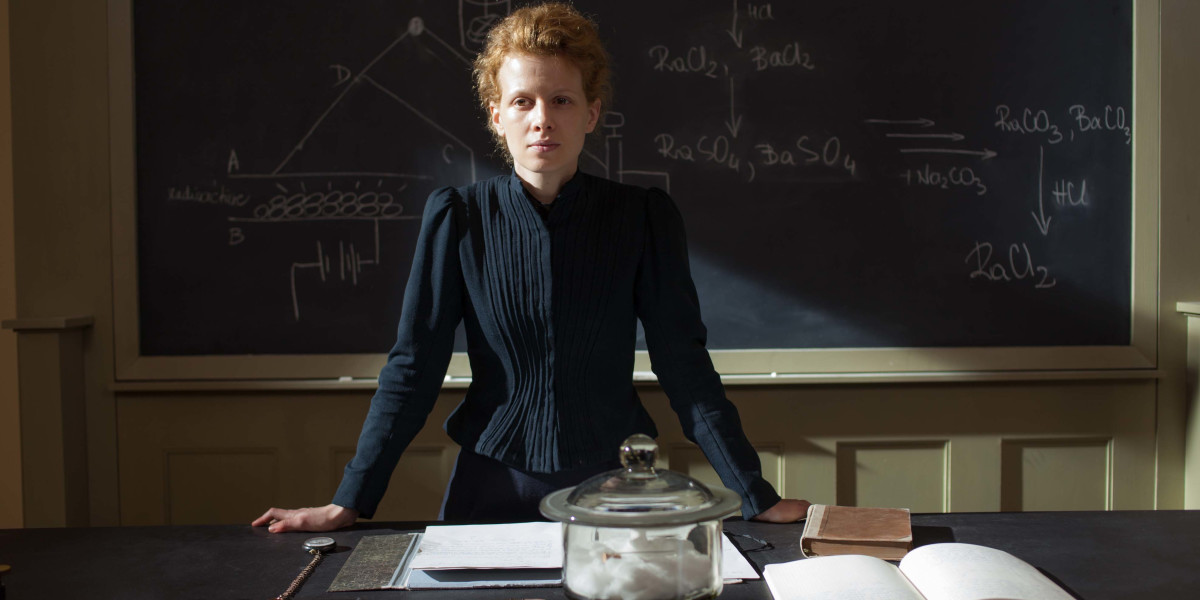
I’m still wrapping up some of my reviews from the Toronto International Film Festival, and one I wanted to make sure I review is MARIE CURIE, THE COURAGE OF KNOWLEDGE. This is a Polish / German / French biopic about one of the greatest scientists of all time, Marie Curie.
Marie Cure was the first woman to win a Nobel Prize, the first person to win two Nobel Prizes, and remains one of only two people to win the prize in two different fields. At first working with her husband Pierre, and then by herself after his death, she isolated and discovered two elements (polonium and radium), and was one of the pioneers in developing the theory underpinning radioactivity. She even coined the term. She then helped bring this to the medical field as a treatment for cancer. In World War I she helped set up radiology labs, and led the Red Cross efforts in these areas. It is estimated that a million soldiers were treated with her equipment. She even died from this work — from repeated exposure to radiation from radium and unshielded x-ray equipment. But her legacy lived on. She founded two institutes, which produced several more Nobel Prizes, including ones for one of her daughters and son-in-law.
What’s even more astonishing is that she did this as a woman in late 19th / early 20th century France while facing discrimination at every turn. Not only was it simply unheard of for a woman to be a professor at the highest levels, as she became more famous she was denigrated for being a Polish immigrant, and for not acting in a way that was deemed suffiently ladylike. She was dogged by scandals in the media for doing things that would barely have raised an eyebrow if a man had done them.
So for my money, Marie Curie is one of the most interesting people of all time. I’ve always thought there should be a modern narrative film about her (the last, MADAME CURIE, is from 1943), so I’m delighted that there finally is. I’m equally delighted that writer/director Marie Noelle has produced a film that is up to the task of presenting Curie as a compelling person in all her complicated grandeur.
The film starts with historical footage of early 1900s Paris, and then zooms in, blending into the modern film. I was somewhat taken aback that it starts after the Curies had already done the early phases of their pioneering research, and indeed had already been awarded, but not yet accepted, their Nobel Prizes. In retrospect, this was the right move, since so much of the drama in Marie’s life started soon after, when her husband was killed in a carriage accident. Though she was clearly the obvious person to carry on their work, the movie shows her struggles to be accepted as a researcher, to be appointed a professor, and to get a laboratory set up. One of my favorite scenes is between her and Albert Einstein. While lesser minds are coming up with excuses to dismiss her, Einstein goes to meetings just to speak with her as one of the greatest minds on the planet.
It is one thing to know that discrimination exists, and it is another to dramatically witness it perpetrated on one of the top scientists who has ever lived. That’s one reason this film is so important. There is still sexism and discrimination in male-dominated fields like physics. Curie wasn’t just a pioneer scientifically, she was a cultural pioneer as well. Her story servers many purposes — as inspiration, as an eye-opener, and as a reminder of how far we’ve come and how far we still have left to go.
Another great thing about Marie Curie captured by the film is that she was not the kind of person to be told how to act. The fact that she was an immigrant and an atheist did not endear her to the French press. But it was her affair with a married colleague that caused them to lay siege to her life. Lesser films (see A BEAUTIFUL MIND) have tried to paper over and romanticize the complicated lives of geniuses. But such artificial mythmaking robs them of their humanity.
Another highlight of the film is the performance of Karolina Gruszka as Marie Curie. She has to cover a wide range here — playing a hard-nosed scientist, a grieving widow, a passionate lover, and a caring mom, and she excels at all aspects. She speaks French here, but like the real Marie Curie, she was born in Poland.
Having said all this, there are a few missed opportunities in the film. For one, sometimes the discussion of the science, even between scientists, is ludicrously dumbed down. This was my problem with THE THEORY OF EVERYTHING. I don’t mind if you explain complex concepts to the audience, but do it through devices like title cards or showing the scientist talking to a nonscientist. Two scientists need to talk like scientists to sell the credibility of the film. Also, at times, the movie looks like a French version of Masterpiece Theater. The sets and costumes look great, but they didn’t have the budget that an American production would have had to get both the highest end cameras and shoot huge outdoor scenes with digital recreations of the time period.
The drawbacks are minor though. The only thing that really matters is that there is a film coming out that tells the wonderful story of MARIE CURIE well. It has good writing in the eye for picking out the most dramatic elements without oversimplifying things, good acting in communicating the humanity of Mme. Curie, and good direction in making something both timeless and highly relevant today.
